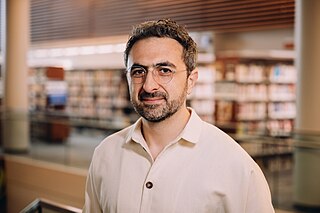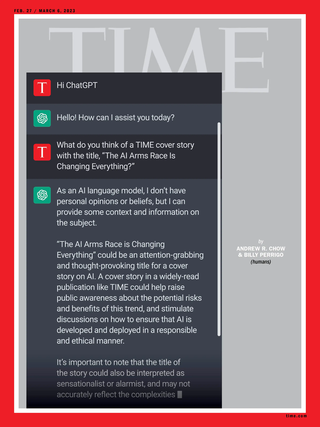Music and artificial intelligence is the development of music software programs which use AI to generate music. As with applications in other fields, AI in music also simulates mental tasks. A prominent feature is the capability of an AI algorithm to learn based on past data, such as in computer accompaniment technology, wherein the AI is capable of listening to a human performer and performing accompaniment. Artificial intelligence also drives interactive composition technology, wherein a computer composes music in response to a live performance. There are other AI applications in music that cover not only music composition, production, and performance but also how music is marketed and consumed. Several music player programs have also been developed to use voice recognition and natural language processing technology for music voice control. Current research includes the application of AI in music composition, performance, theory and digital sound processing.

Mustafa Suleyman is a British artificial intelligence (AI) entrepreneur. He is the CEO of Microsoft AI, and the co-founder and former head of applied AI at DeepMind, an AI company acquired by Google. After leaving DeepMind, he co-founded Inflection AI, a machine learning and generative AI company, in 2022.

Braina is a virtual assistant and speech-to-text dictation application for Microsoft Windows developed by Brainasoft. Braina uses natural language interface, speech synthesis, and speech recognition technology to interact with its users and allows them to use natural language sentences to perform various tasks on a computer in most languages of the world. The name Braina is a short form of “Brain Artificial”.

OpenAI is an American artificial intelligence (AI) research organization founded in December 2015, researching artificial intelligence with the goal of developing "safe and beneficial" artificial general intelligence, which it defines as "highly autonomous systems that outperform humans at most economically valuable work". As one of the leading organizations of the AI boom, it has developed several large language models, advanced image generation models, and previously, released open-source models. Its release of ChatGPT has been credited with starting the AI boom.

Artificial intelligence art is any visual artwork created through the use of an artificial intelligence (AI) program.
Generative Pre-trained Transformer 3 (GPT-3) is a large language model released by OpenAI in 2020.

DALL·E, DALL·E 2, and DALL·E 3 are text-to-image models developed by OpenAI using deep learning methodologies to generate digital images from natural language descriptions known as "prompts".
GitHub Copilot is a code completion tool developed by GitHub and OpenAI that assists users of Visual Studio Code, Visual Studio, Neovim, and JetBrains integrated development environments (IDEs) by autocompleting code. Currently available by subscription to individual developers and to businesses, the generative artificial intelligence software was first announced by GitHub on 29 June 2021, and works best for users coding in Python, JavaScript, TypeScript, Ruby, and Go. In March 2023 GitHub announced plans for "Copilot X", which will incorporate a chatbot based on GPT-4, as well as support for voice commands, into Copilot.
Meta AI is an artificial intelligence laboratory owned by Meta Platforms Inc.. Meta AI develops various forms of artificial intelligence, including augmented and artificial reality technologies. Meta AI is also an academic research laboratory focused on generating knowledge for the AI community. This is in contrast to Facebook's Applied Machine Learning (AML) team, which focuses on practical applications of its products.

Midjourney is a generative artificial intelligence program and service created and hosted by the San Francisco–based independent research lab Midjourney, Inc. Midjourney generates images from natural language descriptions, called prompts, similar to OpenAI's DALL-E and Stability AI's Stable Diffusion. It is one of the technologies of the AI boom.

vidby AG is aa multi-product IT company based in Rotkreuz, Switzerland specializing in the development of AI-powered translation solutions. Founded by Alexander Konovalov and Eugen von Rubinberg in September 2021, the company has garnered attention, especially after gaining the YouTube’s Recommended Vendor status for AI-powered content localization for its video translation and dubbing platform.
Generative Pre-trained Transformer 4 (GPT-4) is a multimodal large language model created by OpenAI, and the fourth in its series of GPT foundation models. It was launched on March 14, 2023, and made publicly available via the paid chatbot product ChatGPT Plus, via OpenAI's API, and via the free chatbot Microsoft Copilot. As a transformer-based model, GPT-4 uses a paradigm where pre-training using both public data and "data licensed from third-party providers" is used to predict the next token. After this step, the model was then fine-tuned with reinforcement learning feedback from humans and AI for human alignment and policy compliance.

Generative artificial intelligence is artificial intelligence capable of generating text, images, videos, or other data using generative models, often in response to prompts. Generative AI models learn the patterns and structure of their input training data and then generate new data that has similar characteristics.

The AI boom, or AI spring, is an ongoing period of rapid progress in the field of artificial intelligence (AI). Prominent examples include protein folding prediction led by Google DeepMind and generative AI led by OpenAI.

Microsoft Copilot is a chatbot developed by Microsoft and launched on February 7, 2023. Based on a large language model, it is able to cite sources, create poems, and write songs. It is Microsoft's primary replacement for the discontinued Cortana.
In the 2020s, the rapid advancement of deep learning-based generative artificial intelligence models are raising questions about whether copyright infringement occurs when the generative AI is trained or used. This includes text-to-image models such as Stable Diffusion and large language models such as ChatGPT. As of 2023, there are several pending U.S. lawsuits challenging the use of copyrighted data to train AI models, with defendants arguing that this falls under fair use.
Inflection AI, Inc. is a technology company which has developed a machine learning and generative artificial intelligence hardware and apps, founded in 2022. The company is structured as a public benefit corporation and is headquartered in Palo Alto, California.
Runway AI, Inc. is an American company headquartered in New York City that specializes in generative artificial intelligence research and technologies. The company is primarily focused on creating products and models for generating videos, images, and various multimedia content. It is most notable for developing the first commercial text-to-video generative AI models Gen-1 and Gen-2 and co-creating the research for the popular image generation AI system Stable Diffusion.
Tabnine is an artificial intelligence (AI) coding assistant developed by Tabnine, which was founded by Dror Weiss and Professor Eran Yahav in Tel Aviv, Israel, in 2013. Initially established under the name Codota, the company underwent a rebranding in May 2021 following the release of the company’s first large language model based AI coding assistant, adopting the name Tabnine.

Udio is a generative artificial intelligence model that produces music based on simple text prompts. It can generate vocals and instrumentation. Its free beta version was released publicly on April 10, 2024. Users can pay to subscribe monthly or annually to unlock more capabilities.









